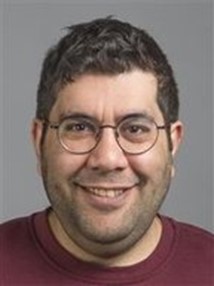Practical workshop on Quantum Computing for Optimization for Process Systems Engineering
Workshop presented by:
David E. Bernal Neira
Assistant Professor, Davidson School of Chemical Engineering, Purdue University
Visiting Associate Scientist, Research Institute of Advanced Computer Science,
Universities Space Research Association
Visiting Scientist, Quantum Artificial Intelligence Laboratory, NASA Ames Research
Center
Seyed Sohaib Mansouri
Associate Professor, Department of Chemical and Biochemical Engineering, Technical
University of Denmark
Quantum computing is processing information through phenomena that can be described
through quantum mechanics. Compared to non-quantum, classical, computing, this
computational paradigm promises to accelerate specific tasks. The study of algorithms
running in quantum computers has spurred a series of novel research in various
areas, including computational chemistry, quantum system simulation, and combinatorial
optimization. Some of these topics are particularly interesting to the Process
Systems Engineering community, as they include core tasks in our profession.
This workshop is aimed to have a hands-on experience with quantum computing
hardware for combinatorial optimization. In particular, we are going to cover
the formulation of problems using quadratic unconstrained binary optimization
(QUBO) models, which, given their equivalence to the transverse field Ising
model, are the standard framework to encode optimization as the energy minimization
of a quantum energy function, or Hamiltonian.
We will then cover the different quantum algorithms designed to
address QUBO problems, including quantum annealing, the quantum approximation
optimization algorithm (QAOA), and variational quantum eigensolvers (VQE). We
will explore the different topics while executing codes in quantum simulators,
quantum annealers, gate-based quantum computers, and other novel hardware for
this framework. All the codes are developed as open-source alternatives and
run on cloud services, allowing anyone with an internet browser to experience
using quantum computers.
We will wrap up covering current research relevant to chemical and biochemical
product and process design through these methods and provide the participants
with the starting pieces for them to start exploring the world of quantum computing.
Time Agenda
9:30 am Introduction
9:45 am Overview of Quantum Mechanics: Basics to understand and use quantum
computing
10:30 am Basics of constrained optimization and modeling using open-source software
JuMP
11:30 am Quadratic Unconstrained Binary Optimization
12:00 Lunch Break
1:00 pm Solving QUBO problems using Quantum Annealers: The Quantum Adiabatic
Algorithm and Quantum Annealing
2:00 pm Solving QUBO problems using gate-based Quantum Computers: QAOA and VQE
3:00 pm Research talk: Quantum computing for chemical and biomolecular product
design
3:30 pm Research talk: Discrete nonlinear optimization: Modeling and solutions
via novel hardware and decomposition algorithms
4:00 pm Adjourn
References
1. Bernal, David E., Akshay Ajagekar, Stuart M. Harwood, Spencer T. Stober,
Dimitar Trenev, and Fengqi You. "Perspectives of quantum computing for
chemical engineering." AIChE Journal 68, no. 6 (2022): e17651.
2. Andersson, M. P., Jones, M. N., Mikkelsen, K. V., You, F., & Mansouri,
S. S. (2022). Quantum computing for chemical and biomolecular product design.
Current Opinion in Chemical Engineering, 36, 100754.
3. Xavier, Pedro Maciel, Pedro Ripper, Tiago Andrade, Joaquim Dias Garcia, Nelson
Maculan, and David E. Bernal Neira. "QUBO. jl: A Julia Ecosystem for Quadratic
Unconstrained Binary Optimization." arXiv preprint arXiv:2307.02577 (2023).
4. Carberry, Deborah, Amirhossein Nourbakhsh, Jay Karon, Mark N. Jones, Mojgan
Jadidi, Kyarash Shahriari, Christian Beenfeldt, Martin Peter Andersson, and
Seyed Soheil Mansouri. "Building knowledge capacity for quantum computing
in engineering education." In Computer Aided Chemical Engineering, vol.
50, pp. 2065-2070. Elsevier, 2021.
5. Bernal, David E., Sridhar Tayur, and Davide Venturelli. "Quantum Integer
Programming (QuIP) 47-779: Lecture Notes." arXiv preprint arXiv:2012.11382
(2020).
David E. Bernal Neira

Dr. Bernal Neira is an Assistant Professor in the Davidson School of Chemical Engineering at Purdue University and Principal Investigator of the Systems Engineering via Classical and Quantum Optimization for Industrial Applications SECQOUIA research group. He specializes in applying mathematical and computer science tools to address problems relevant to science and engineering, such as physics and chemical, process, and energy systems engineering. His main work is in nonlinear discrete optimization, where, besides applications, he has been working in theory, algorithms, and software. He has researched and taught these topics for over a decade, with a recent incursion in Quantum Computing. He is a visiting scientist at the NASA Quantum Artificial Intelligence Laboratory and the Research Institute of Advanced Computer Science from the Universities Space Research Association (USRA).
Seyed Sohaib Mansouri

Dr. Seyed Soheil Mansouri is an Associate Professor in the Department of Chemical and Biochemical Engineering at the Technical University of Denmark (DTU) and affiliate faculty at the Sino-Danish Center for Education and Research in Beijing, China. His current research is focused on Process Systems Engineering, System Dynamics, EdTech focused on Computational Agility (AI and Quantum Computing), Socio-Economic-Technological Analysis of Complex Dynamic Systems, Process Synthesis, Design, Control, and Intensification with a focus on Chemical, Pharmaceutical, and Bio-manufacturing sectors. He is a senior member of the American Institute of Chemical Engineers (AIChE) and a Danish delegate to the Computer-Aided Process Engineering (CAPE) Working Party of the European Federation of Chemical Engineers (EFCE). He is also treasurer and board member of the European Committee for the Use of Computers in Chemical Engineering Education (EURECHA)
